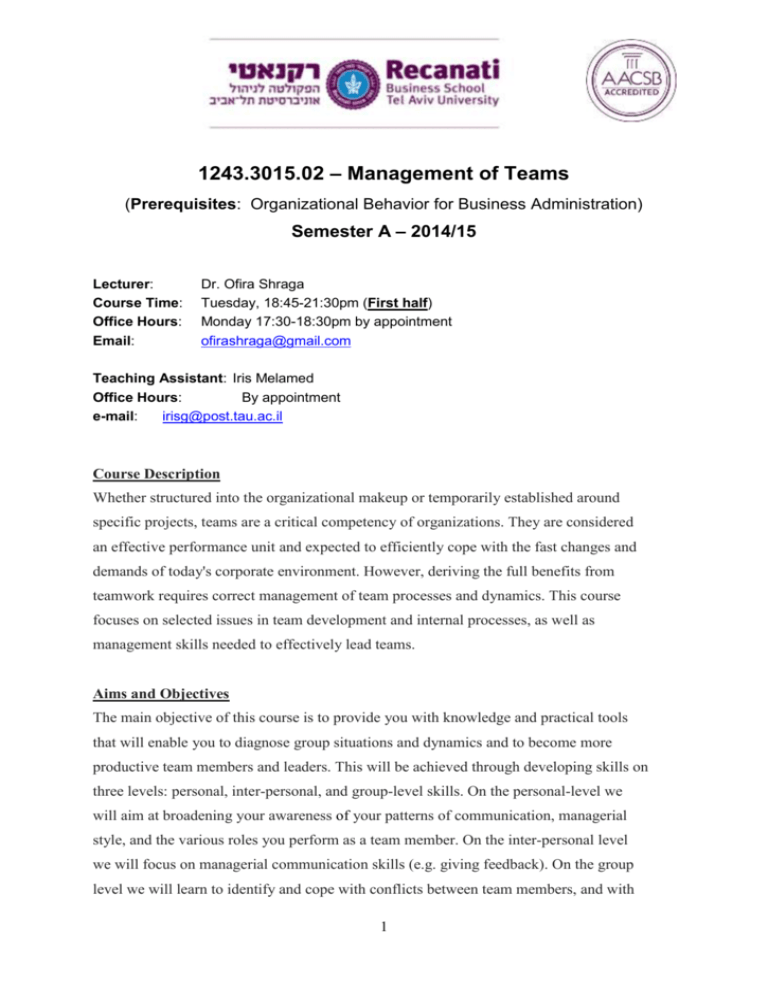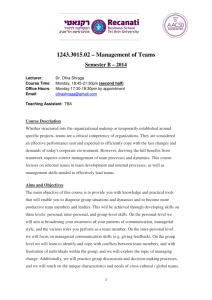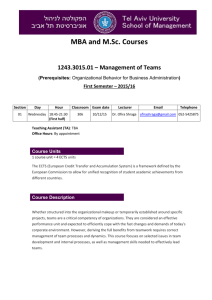
1243.3015.02 – Management of Teams
(Prerequisites: Organizational Behavior for Business Administration)
Semester A – 2014/15
Lecturer:
Course Time:
Office Hours:
Email:
Dr. Ofira Shraga
Tuesday, 18:45-21:30pm (First half)
Monday 17:30-18:30pm by appointment
ofirashraga@gmail.com
Teaching Assistant: Iris Melamed
Office Hours:
By appointment
e-mail:
irisg@post.tau.ac.il
Course Description
Whether structured into the organizational makeup or temporarily established around
specific projects, teams are a critical competency of organizations. They are considered
an effective performance unit and expected to efficiently cope with the fast changes and
demands of today's corporate environment. However, deriving the full benefits from
teamwork requires correct management of team processes and dynamics. This course
focuses on selected issues in team development and internal processes, as well as
management skills needed to effectively lead teams.
Aims and Objectives
The main objective of this course is to provide you with knowledge and practical tools
that will enable you to diagnose group situations and dynamics and to become more
productive team members and leaders. This will be achieved through developing skills on
three levels: personal, inter-personal, and group-level skills. On the personal-level we
will aim at broadening your awareness of your patterns of communication, managerial
style, and the various roles you perform as a team member. On the inter-personal level
we will focus on managerial communication skills (e.g. giving feedback). On the group
level we will learn to identify and cope with conflicts between team members, and with
1
frustration of individuals within the group, and we will explore the topic of managing
change. Additionally, we will practice group discussions and decision-making processes,
and we will touch on the unique characteristics and needs of cross-cultural / global teams.
Course Format
The primary teaching method of this course is experiential; therefore, only about half of
class time will be devoted to standard lectures. The rest will include watching videos,
case analysis, small-groups' simulations, and role-play, all aimed at demonstrating and
practicing the various skills required to effectively manage teams. Personal assessment
and group feedback will also be used as part of the learning process.
The course will take place in the second half of the semester and will include 7 meetings,
double the length of a regular class.
Course Requirements and Assessment
1. Attendance and participation in class - 10%
2. Final paper - 20%
3. Final examination - 70%
Due to the nature of the course attendance is especially important and is expected. If
you miss 3 or more classes you will not be allowed to take the exam or finish the course.
Detailed Course Plan (note that items marked with * are only recommended readings,
and will not be included in the exam).
Class 1:
Defining teams; Benefits and dysfunctions of teamwork;
Teams’ internal dynamics: Stages of team development, team roles.
Readings:
Katzenbach & Smith (2003), ch. *1,3,*5
*Lumsden, 301-310
Maier (1999).
Schein, ch. 8 (pp.145-152)
*Slocum & Helriegel, 318-332.
Class 2:
Dysfunctional Team Dynamics
Readings:
Slocum & Helriegel, 221-234, 347-350
Thompson, 29-38, 172-179, 186-191
2
Class 3:
Participative vs. autocratic team leadership, decision making in teams.
Readings:
Thompson, 310-313
*Vroom (2007)
*Vroom & Jago (2007)
Class 4:
Team discussions: Rational problem solving model
Readings:
Thompson, ch. 7 (pp. 157-165, 170-175)
Whetten & Cameron, ch. 3 (pp.178-183)
*Schein, ch. 8, (pp. 152-171)
*Slocum & Helriegel, ch. 8 (pp. 235-239)
Class 5:
Managing conflicts in teams; an open discussion.
Readings:
* Gibson & Cohen, pp. 335-352
* Moodian, pp. 222-226
Slocum& Helriegel, ch. 9 (pp. 248-258)
Thompson, ch. 8 (pp. 184-189, 197-198).
Class 6:
Communication in teams; Effective feedback;
Defensive vs. supportive communication.
Readings:
Rothwell, 120-132
Thompson, ch. 8
Schein, ch. 7 (pp. 130-141)
Daft, ch. 3 (pp. 273-276)
Class 7:
Global teams: Virtual and cross cultural.
Readings:
Thompson (2008), ch. 13 (pp. 332-335)
*Gibson & Cohen (2003) pp. 21-36, 403-421
*Hertel et al., (2005)
Moodian (2009) pp. 95-106, 145-157, 233-237
3
Reading Material
Daft, R. (2011). The leadership experience (5th ed.). U.S.A, OH: South-Western Cengage
Learning, Mason.
Ch. 9
Gibb J. R. (2008). Defensive Communication. In C.D. Mortensen (Ed.). Communication
Theory (2nd ed.). Piscataway, NJ, U.S: Transaction Publishers (pp. 201-208).
Gibson, C.B., & Cohen, S.G. (2003). Virtual teams that work: creating conditions for virtual
team effectiveness. CA, San Francisco: Jossey – Bass. Selected pages.
Hertel, G., Geister, S., & Konradt, U. (2005). Managing virtual teams: A review of current
empirical research. Human Resource Management Review,15, 69-95.
Katzenbach, J.R. & Smith, D.K. (1999). The wisdom of teams, NY: Harper Collins.
Selected pages.
Lumsden, G., Lumsden, D., & Wiethoff, C. (2010). Communicating in groups and teams:
Sharing leadership. Boston, MA: Wadsworth. Selected pages.
Maier, N.R.F. (1999). Assets and liabilities in group problem solving: The need for an
integrative function. Group Facilitation. Winter (1), 45-51.
Moodian, M.A. (2009). Contemporary leadership and intercultural competence: Exploring
the cross cultural dynamics within organizations. Sage Publications. Selected pages.
Rothwell, J.D. (2009). In mixed company: Communicating in small groups and teams (7th
ed). Boston, MA: Wadsworth. Selected pages.
Schein, E. (1999). Process consultation revisited. Reading, MA: Addison Wesley.
Selected pages.
Slocum, J.W. Jr, & Hellriegel, D (2007). Fundamentals of Organizational behavior. Mason,
OH: Thomson South-Western. Selected pages.
Thompson, L.L.(2008). Making the team: A guide for managers (3rd edition). NJ: Pearson
Prentice Hall. Selected pages.
Vroom, V.H. (2007). Can leaders learn to lead? In R.P. Vecchio, (Eds.), Leadership:
Understanding the dynamics of power and influence in organizations. U.S.: University of
Notre Dame Press. (pp.259-272).
Vroom, V.H. & Jago, A.G. (2007). The role of the situation in leadership. American
Psychologist, 62(1), 17-24.
Whetten, D.A. & Cameron, K.S. (2007). Developing management skills. NJ:Pearson Prentice
Hill. Selected pages.
4









